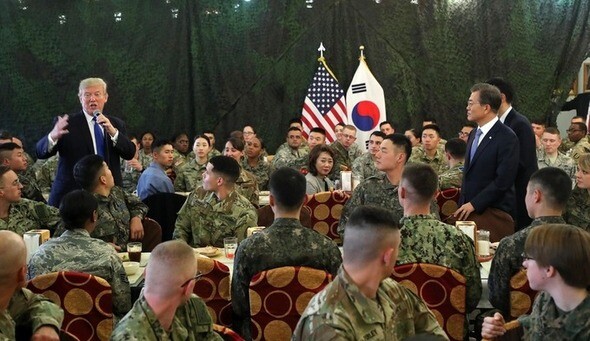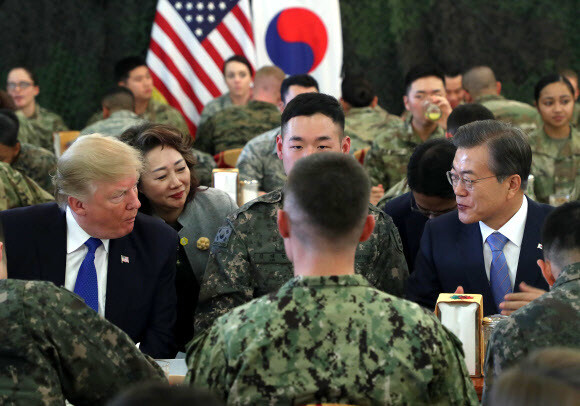hankyoreh
Links to other country sites 다른 나라 사이트 링크
[Editorial] SK government needs to assert national interest on KORUS FTA, weapons purchases

With their Nov. 7 summit, South Korean President Moon Jae-in and US President Donald Trump displayed strong cooperation in the face of the North Korean nuclear threat. A symbolic moment came when the two leaders visited Camp Humphreys, a US military base in Pyeongtaek. In a post-summit press conference, Moon reaffirmed his commitment to achieving a peaceful resolution to the North Korean nuclear issue, establishing a permanent peace regime on the Korean Peninsula, and responding sternly to North Korea’s nuclear and missile threats through overwhelming superiority of power. He also made it clear that Seoul and Washington’s strategy on the North would involve tougher sanctions and pressure “until Pyongyang gives up its nuclear weapons and enters dialogue.” Trump lent support to Moon and countered claims of South Korea being “bypassed” by stressing that South Korea was “very important” to him.
The summit was very much about two the presidents allaying fears in South Korea and the US and sending a unified message with their mutual warmth and emphasis of commonalities over differences. A closer look, however, suggests the Moon administration has some work cut out for it going ahead. Trump talked about how he “hope[s] to God we never have to use” the various forms of military hardware the US has displayed in response to North Korea’s provocations. It’s essential for the security of the Korean Peninsula that we send a resolute message on those provocations and ensure that we are capable of a stern response. But Seoul will also need to work relentlessly to get the Trump administration to commit to the same principle stated by Moon: that war on the peninsula is unacceptable, and that the North Korean nuclear issue is to be resolved peacefully.
While the two sides showed no differences in the broader scheme of things, there are a number of areas where their interests could end up clashing in terms of their agreement on acquiring strategic military assets to beef up South Korea’s independent defense capabilities. During the two leaders’ joint press conference, Trump said South Korea “will be ordering billions of dollars of [military] equipment,” which “means jobs” for the US. His main interest was made clear during his Camp Humphreys visit, when he said he hoped the summit would “start working out . . . so that we create a lot of jobs in the United States, which is one of the reasons that I’m here.” His remarks show domestic political considerations to be clearly at work.
There is no way to get around buying US weaponry if that’s what is needed for our self-defense. But there have been a few controversies in the past over South Korea being made to buy weapons that performed poorly or were unnecessary for us. Our motivation for purchasing weapons cannot be a matter of “strengthening the alliance” or “creating jobs in the US” – as opposed to our own practical security needs.
With his emphasis on “defense cost-sharing at an adequate and reasonable level,” Trump also hinted at a tough road ahead when the two sides begin negotiating their respective shares of defense costs next year. When told by a reporter that South Korea had footed a large part of the bill for the Pyeongtaek base, Trump bluntly said the money had been spent to protect South Korea, not the US. This gives some idea of his basic standpoint when it comes to South Korea’s share of defense costs.
Rather than simply not showing any differences with Trump on the alliance or North Korean nuclear issues, the administration needs to uphold South Korea’s interests in what promise to be tough negotiations on defense costs, the South Korea-US FTA, and weapon purchasing. It’s an unfortunate thing when the alliance and national interests are in conflict.

Please direct questions or comments to [english@hani.co.kr]

Editorial・opinion
![[Column] Season 2 of special prosecutor probe may be coming to Korea soon [Column] Season 2 of special prosecutor probe may be coming to Korea soon](https://flexible.img.hani.co.kr/flexible/normal/500/300/imgdb/original/2024/0426/3317141030699447.jpg) [Column] Season 2 of special prosecutor probe may be coming to Korea soon
[Column] Season 2 of special prosecutor probe may be coming to Korea soon![[Column] Park Geun-hye déjà vu in Yoon Suk-yeol [Column] Park Geun-hye déjà vu in Yoon Suk-yeol](https://flexible.img.hani.co.kr/flexible/normal/500/300/imgdb/original/2024/0424/651713945113788.jpg) [Column] Park Geun-hye déjà vu in Yoon Suk-yeol
[Column] Park Geun-hye déjà vu in Yoon Suk-yeol- [Editorial] New weight of N. Korea’s nuclear threats makes dialogue all the more urgent
- [Guest essay] The real reason Korea’s new right wants to dub Rhee a founding father
- [Column] ‘Choson’: Is it time we start referring to N. Korea in its own terms?
- [Editorial] Japan’s rewriting of history with Korea has gone too far
- [Column] The president’s questionable capacity for dialogue
- [Column] Are chaebol firms just pizza pies for families to divvy up as they please?
- [Column] Has Korea, too, crossed the Rubicon on China?
- [Correspondent’s column] In Japan’s alliance with US, echoes of its past alliances with UK
Most viewed articles
- 1‘We must say no’: Seoul defense chief on Korean, USFK involvement in hypothetical Taiwan crisis
- 2[Column] Season 2 of special prosecutor probe may be coming to Korea soon
- 3N. Korean delegation’s trip to Iran shows how Pyongyang is leveraging ties with Moscow
- 4Amnesty notes ‘erosion’ of freedom of expression in Korea in annual human rights report
- 5Korea sees more deaths than births for 52nd consecutive month in February
- 6[Reportage] On US campuses, student risk arrest as they call for divestment from Israel
- 7[Editorial] New weight of N. Korea’s nuclear threats makes dialogue all the more urgent
- 8‘Weddingflation’ breaks the bank for Korean couples-to-be
- 9Division commander ordered troops to enter raging flood waters before Marine died, survivor says
- 10[Editorial] Korea’s surprise Q1 growth requires objective assessment, not blind fanfare